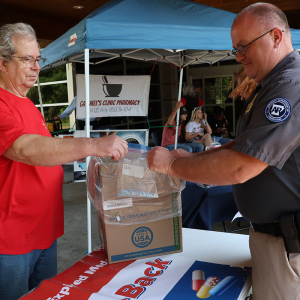Give Me a Break: Resources for Caregivers Experiencing Burnout

Caring for a loved one with poor health is one of the most rewarding jobs in the world. But it’s also among the hardest, and those who do it typically don’t even get paid for their work.
It’s very common for those who care for loved ones at home to experience burnout, where they might feel emotionally, physically and mentally exhausted from the long-term stress of being a care provider.
“Most commonly, they feel tired all the time. Their health declines. They have no time for friends. They have poor sleep and don’t have time to go to the doctor,” says Dr. Gohar Azhar, a distinguished professor of geriatric medicine at UAMS and co-director of cardiovascular aging research at the Donald W. Reynolds Institute on Aging.
Approximately 420,000 Arkansans – about 13.6% of the state’s population – care for aging loved ones at home. A 2022 study by the Arkansas Lifespan Respite Coalition found that only 32% of those caregivers have assistance from home health aides, housekeepers or other family members, and most of those that did report having outside help noted that the other caregivers were also unpaid.
“Caregivers need respite, because otherwise, they can collapse,” Azhar says.
Respite care gives caregivers an opportunity to take a break that can range from a few hours to a few days. Adult day care centers and in-home health care can be considered respite care.
The Arkansas Lifespan Respite Coalition is a statewide initiative started under former Gov. Asa Hutchinson to be a hub of information about regionally available respite care. The program offers a free, searchable database of private, in-home respite care providers throughout the state and facility environments that can provide respite.
Azhar said social workers can also help connect burnt-out caregivers with assistance.
“(They should) talk to their own doctor and social worker,” she says. “Caregivers should share their burdens with friends, and seek psychological help, even online.”
The dangers associated with caregiver burnout aren’t limited to the caregiver. Health and safety outcomes for those they care for can also be impacted, Azhar said.
“There could be neglect and lack of appropriate care. Unfortunately, sometimes a burnt-out caregiver can also engage in physical or emotional abuse,” she says.
Arkansas Area Agencies on Aging offer caregiver support groups, and UAMS’ Arkansas Geriatric Education Collaborative hosts an online caregiver support group. Seeking out help when it’s needed is the best way to ensure both caregivers and those in their care are maintaining their health.
“For a dedicated caregiver, there is always dismay, guilt and depression at not being able to provide care,” Azhar says. “Social workers can help caregivers with long-term planning, resolving conflicts, suggesting different ways of doing things to reduce anxiety and stress and provide information on resources.
“We need holistic care models for seniors,” she adds.








